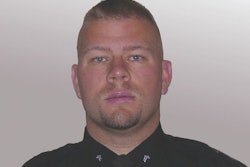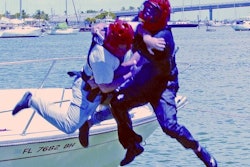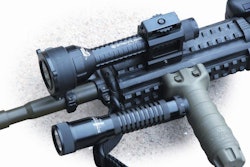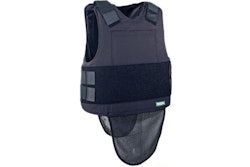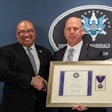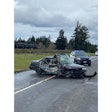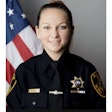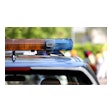Officer Darren Bristow of the Tulsa (Okla.) Police Department came close to avoiding the entire episode. But isn't that usually the case? It's the cop who stays an hour longer than he'd planned...It's the patrolman who swaps shifts to get a day off...It's the trooper who decides to make just one more t-stop before calling it a day who ends up having a really bad shift.
Seemingly innocuous scheduling decisions have proven fateful for more than one cop. And when Bristow would later look back on the incident, he'd wonder if it hadn't come down to fate.
Bristow's feelings of predestination are understandable. After all, he almost didn't even work that Saturday night in October 2002. His wife Linda's birthday fell on Thursday of that week, and their decision to observe it on either Friday the twelfth or Saturday the thirteenth had come down to a coin flip. They ended up celebrating on Friday, thereby obligating Bristow to work the Saturday shift.
That was fateful decision number one.
Even then, Bristow's Saturday started off uneventful enough. His afternoon was spent with fellow off-duty officers talking shop, followed by a Sooners game on TV. Then he went to work.
On duty that night, Bristow might still have avoided the shooting altogether if early in the shift he'd taken up another officer's invitation to do a prisoner transport. But he took a pass, electing to handle whatever came over the radio.
That was fateful decision number two.
But even passing up the invitation hadn't committed him. No, it wasn't until the "shots fired" call went out that everything started to turn against him, fall into place, and seal his fate. And then Bristow only became involved when he took the handle from another officer who had an extended ETA.
That was fateful decision number three. And trouble comes in threes.
Citizen Complaint
Bristow was well familiar with the residential area, and had even driven through it earlier that same shift. He knew that there was a park nearby where people on occasion liked to congregate, blowing off steam and, occasionally, some fireworks.
Shots fired calls were not unique around these parts. In fact, they can be counted on with such a degree of frequency that Bristow had to make continual effort to not let his guard down.
It wasn't until he drove eastbound on 4th Street and was flagged down by the citizen who called in the complaint that Bristow's thinking about the call started to shift. The neighbor who lived directly behind the man who called in the "shots fired" had been firing a shotgun just five minutes before Bristow's arrival.
Not normally in the habit of grabbing his shotgun on calls, Bristow did so as he got out of his patrol car. Later, he would say that he wasn't sure why he reached for the heavy artillery. Perhaps at some subliminal level he thought he should "fight fire with fire."
The informant escorted Bristow along the side of his house to the backyard where he could see the neighboring property. As they rounded the rear corner of the informant's house, the resident pointed out a house directly opposite. "That's the house. He's right inside."
Going In
The citizen's shaky tone did little to calm Bristow's nerves. Cradling the Remington 870 shotgun in his right arm and his flashlight in his left hand, Bristow accompanied the man deeper into the backyard.
The evening wasn't pitch black, but it might as well have been. Trees off to Bristow's left obscured what little light emanated from beyond. He couldn't see a thing.
Bristow sized up the tactical situation. It wasn't good. Whoever might be still prowling around in the back property could be acutely aware of Bristow's approach and have the drop on him before he even knew it. A chainlink fence separating the properties offered scant concealment and even less cover.
Bristow wasn't wild about having the informant escort him around the rear yard, but the man's knowledge of the yard helped him make a surreptitious approach. It also mitigated the need for a flashlight, which could have given away his presence and provided the shotgun-wielding man a target. Still, Bristow didn't like involving a civilian in such a hairy operation, and he was conscientious about keeping himself between the shooter and the informant.
Beyond the fence lay the patio and backyard of the shooter's house. Off to his left, just beyond the property line, was a swing set. A small dog made circles about the yard. At least the animal wasn't barking.
Standing at a bladed angle to the house, Bristow broadcast what information he could over his portable radio, giving landmark coordinates to responding officers on 3rd Street.
Bristow turned to his civilian guide for whatever information he could get about the suspect. The informant could only say that the man was an English-speaking Hispanic. Bristow wondered aloud why the man would be firing a shotgun. He recalled the televised Sooners' victory earlier that afternoon and he hoped the shots were just an inappropriate celebration.
Five uneventful minutes passed as Bristow's fellow officers converged around the front of the house. Bristow and the informant were in a vulnerable position, and he was happy to have more members of the Tulsa PD on the scene. Bristow was also comforted when he heard another officer advise that he could see a man smoking cigarettes inside the house.
If this guy was just standing in his house smoking, maybe he wasn't determined to shoot it out with the cops. Maybe everything would go down nice and quiet.
Still, Bristow knew that if they were to successfully contain the rear of the location, he would need additional assistance. He requested another unit to roll.
Drop the Gun!
As Bristow waited for his backup, he idly contemplated the likelihood that the Special Operations Team would soon roll up to deal with the man.
Then he heard a noise coming from the direction of the suspect's house. Switching on his flashlight, Bristow rotated in the direction of the noise. He saw a man carrying a long gun walking toward him.
"Police!" Bristow announced. "Drop the gun! Get on the ground. Now!"
Bristow saw the muzzle flash of the man's shotgun. His left arm and side were peppered with shot, and his flashlight went flying into the night.
Twin thoughts flashed through Bristow's mind. "It feels like hot gravel." And, "I've been shot."
Bristow wanted to return fire. But the citizen complainant was in the way. He moved for a better angle and squeezed the Remington's trigger, firing from the hip.
Bristow was in a shotgun duel and his attacker was not giving up. Each time Bristow racked the Remington and chambered another .00 Buck shell, he took another hit.
The two men exchanged fire again, aiming at each other's muzzle blasts in the darkness. Bristow took pellets to the chest, right side, and leg, the force of the blast knocking him back and to his right. He was shooting back, but apparently missing.
If I don't start hitting him, he's going to kill the neighbor or me. Or both, Bristow thought.
Bristow fired as quickly as he could. Some 60 feet separated the two men and somewhere in Bristow's over-stimulated synapses an objective appraisal of the situation struck home: Damned if this jerk isn't hitting exactly what he's aiming for: Me.
Working the pump-action shotgun as furiously as possible, Bristow matched the suspect volley-for-volley. Then he heard the distinctive "click" signifying an empty chamber.
The Remington was spent.
He dropped the shotgun and drew his .40 caliber Glock.
The bad guy still had plenty of shells. The muzzle of his shotgun flashed amber and pellets ripped into Bristow's face and shoulder. Still more buried themselves into his vest.
Blood ran down Bristow's face, blurring his vision and marring his aim. The polycarbonate prescription glasses he'd purchased just weeks before were now cockeyed. He ripped them off and threw them to the ground, then he swiped at his blood-streaked face.
The suspect fired another shotgun blast.
Did he get me again? Bristow thought.
But Bristow didn't have time to inventory himself for injuries. He raised his sidearm to hip level and let loose three rounds rapid-fire in the direction of the suspect's muzzle flashes, hoping for hits but more than willing to settle for suppression.
Suddenly a quiet fell over the scene.
Have I hit him, driven him back into the house, or is he reloading? Bristow thought.
Let's Get Out of Here!
Bristow saw the white shirt of his informant lying face down and motionless on the ground. Reaching down and wrapping his left hand in the neck of the man's T-shirt, Bristow lifted. "Sir, let's get out of here!"
The informant jumped up and the two men ran back to the gate where they'd entered the yard. Bristow kept one eye on the subject's backyard, but still had no idea what had happened to the shooter.
Out front, Bristow keyed his radio.
"Shots Fired! I've been shot!"
The vest had saved his life, and the prescription glasses had done their job, too. At least two pellets had been deflected off their lenses. Bristow had been fortunate that the suspect was using number nine birdshot. Still, without the .22-caliber-rated protection of the polycarbonate lenses, the pellets would have taken out his eyes and buried themselves in his brain. He would later learn that his body had absorbed some 103 pellets, many of which it continues to expel to this day.
By the time the suspect, Benito Hernandez, exited the house to take a position at the side of his truck, some 30 officers had arrived on scene and were waiting for him. When Hernandez took cover in the space between the truck's cab and door and began shooting randomly, he was shot dead in the driveway. But not before two of Bristow's closest friends were injured as well.
Nevertheless, it could have been worse. Investigators say that Hernandez had shown up at the house earlier in the day with the intention of killing his estranged wife and kids. She'd fled with the children before his arrival.
Purple Heart
Fortunately, Hernandez had not loaded his weapon with .00 Buck. If he had, Bristow and his fellow officers could well have been killed. Even so, Bristow is thankful he spent a little extra money for the polycarbonate lenses.
As for his tactics on the day of the shooting, he says that while things worked out, he would have done at least one thing differently: He wouldn't have allowed the informant to stay in the backyard with him.
Darren Bristow was awarded the Purple Heart and the Medal of Valor from the Tulsa Police Department. He was also named Officer of the Year by the Tulsa Area Women in Insurance, a distinction he shared with another local officer.
In 2003, Bristow was named one of the top 10 officers of the year by Parade magazine and the International Association of Chiefs of Police. He was promoted to corporal in February 2005.
Dean Scoville is a patrol supervisor with the Los Angeles County Sheriff's Department and a contributing editor for Police.






